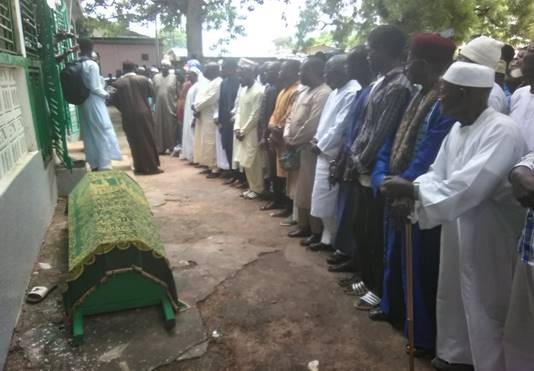Buried at the Latrikunda Yiringanya graveyard, Ousman Darboe of Sierra Leonean origin is said to be married to a Gambian from Sika. His remains are now one with the earth. Post mortem was done and his body returned to the family for burial rites.
Imam Drammeh of the Latrikunda Yiringanya mosque did give a sermon. He indicated that faith comprises the performing of the five key injunctions and acting towards one’s neighbour in good faith with good will. He argued that doing wrong to others has its wages. He informed the congregation that one could do everything that constitutes practice of faith but as long as one does harm to one’s neighbour, one may not gain the reward one expects.
According to him, the wages of doing harm to others is to have one’s good works paid to them. In the event that one’s good works is not enough to pay for the evil done by them will be passed onto them. In short, the message was clear. The bad things that a human being does is interred with them to be paid for at their own peril.
In his sermon he emphasised that conflict is asleep and curse are those who awaken it for it will consume not only others but also those who awaken it. He therefore called for restraint on the side of the authorities and restraint on the side of the youth who he said should remember the impasse when people started to leave the country in droves in fear of a violent outbreak.
Ousman Darboe is gone. Only words of wisdom enveloped his burial. Gambians and Sierra Leoneans alike counselled peace and good neighbourliness, sighting similarities of surnames and ethnolinguistic origins as well as religious and cultural ties. “We are the same people,” said the head of Sierra Leonean Community who is also the head of the Ecowas community.
On his part, Halifa Sallah conveyed that fire could bring delicious food on the table or consume the investment of a lifetime. And that state power that is unrestrained by laws and justice would lead to tyranny and inhume treatment, while power that is unguided by reason and justice would become a bush fire that would consume all properties. He called for power to be retrained by reason, truth and justice if peace is to be nurtured and sustained.
The atmosphere at the mosque, the graveyard and the home instilled a sense of real loss and solidarity of his widow who is reduced to a single parent by an incident or co-incident which is still inexplicable.
The lesson however is clear. The state can best guarantee peace by being a protector of its citizens. Where there is civil disobedience the best approach is to prevent recurrence. When thousands take to the street and the state finds it impossible to indict them all, picking up a few to indict them for the action would amount to selective justice. A state has nothing to gain in perpetrating selective justice. It would only undermine initiatives for reconciliation.

















